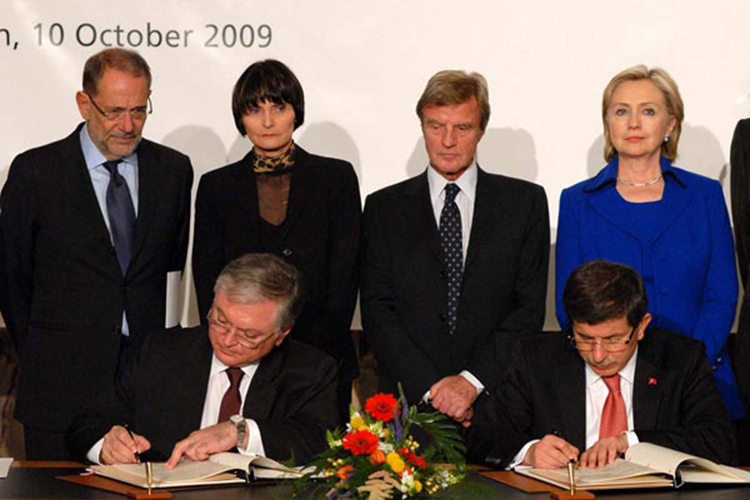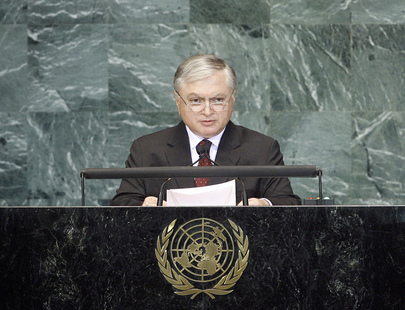ATHENS (RFE/RL) — Foreign Minister Edward Nalbandian reaffirmed on Wednesday the Armenian government’s intention to formally annul U.S.-brokered agreements to normalize Armenia’s relations with Turkey, citing Ankara’s “groundless preconditions” for their implementation.
The two protocols signed in Zurich in October 2009 committed Turkey and Armenia to establishing diplomatic relations and opening their border. Shortly after the high-profile signing ceremony, Ankara made clear, however, that Turkey’s parliament will ratify the deal only if there is decisive progress towards a resolution of the Nagorno-Karabakh conflict acceptable to Azerbaijan.
The Armenian government rejected this precondition, arguing that the protocols make no reference to the conflict. The United States, the European Union and Russia have also repeatedly called for their unconditional implementation by both sides.
President Serzh Sarkisian again denounced Turkey’s stance when he addressed the UN General Assembly in September. “Given the absence of any progress towards their implementation, Armenia will declare the two protocols null and void,” he said. “We will enter the spring of 2018 without those, as our experience has demonstrated, futile protocols.”
Nalbandian echoed that statement during a visit to Greece. “Those documents have still not been ratified since Turkey came up with groundless preconditions that run counter to the letter and spirit of the protocols,” he said.
“Those documents cannot be held hostage forever, and that is why the president of Armenia declared in September … that Armenia will declare the protocols null and void,” Nalbandian said in a speech delivered at the Greek Foreign Ministry.
Ankara has still not officially reacted to Sarkisian’s September statement. Successive Turkish governments have kept that border with Armenia completely closed since 1993 in a show of support for Azerbaijan.
Sarkisian already threatened in February 2010 to scrap the protocols if they are not ratified by the Turks “in the shortest possible time.” But he avoided doing that, saying two months later that he does not want to upset the U.S. and other world powers that strongly backed the landmark deal.
Speaking after talks with Greek Foreign Minister Nikos Kotzias, Nalbandian also described Greek-Armenian relations as a “true brotherhood.” “We both suffered from genocides and crimes against humanity, defended shoulder-to-shoulder our right to life and stood by each other in difficult times,” he said.
Meeting with Sarkisian in Athens last year, Greece’s Prime Minister Alexis likewise said that Armenians and Greeks were victims of genocide perpetrated by the Ottoman Turks during World War One. For his part, Greek President Prokopis Pavlopoulos told his Armenian counterpart that “at the beginning of the 20th century the two peoples endured tragic moments for the same reason.”
Turkey condemned those statements. “Solidarity between Greece and Armenia is built upon a joint hostility and slander language directed against the Turkish identity,” a Turkish Foreign Ministry spokesman said in March 2016.
Greece’s strained relations with Turkey, a fellow NATO member, again came to the fore during Turkish President Recep Tayyip Erdogan’s official visit to Athens last week.










